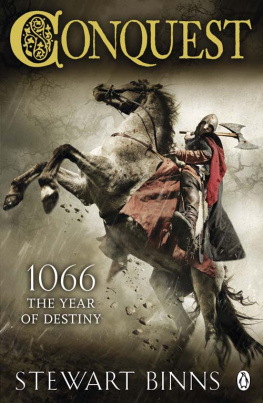Stewart Binns - Conquest
Here you can read online Stewart Binns - Conquest full text of the book (entire story) in english for free. Download pdf and epub, get meaning, cover and reviews about this ebook. year: 2011, publisher: Penguin Books Ltd, genre: Detective and thriller. Description of the work, (preface) as well as reviews are available. Best literature library LitArk.com created for fans of good reading and offers a wide selection of genres:
Romance novel
Science fiction
Adventure
Detective
Science
History
Home and family
Prose
Art
Politics
Computer
Non-fiction
Religion
Business
Children
Humor
Choose a favorite category and find really read worthwhile books. Enjoy immersion in the world of imagination, feel the emotions of the characters or learn something new for yourself, make an fascinating discovery.
- Book:Conquest
- Author:
- Publisher:Penguin Books Ltd
- Genre:
- Year:2011
- Rating:3 / 5
- Favourites:Add to favourites
- Your mark:
- 60
- 1
- 2
- 3
- 4
- 5
Conquest: summary, description and annotation
We offer to read an annotation, description, summary or preface (depends on what the author of the book "Conquest" wrote himself). If you haven't found the necessary information about the book — write in the comments, we will try to find it.
Conquest — read online for free the complete book (whole text) full work
Below is the text of the book, divided by pages. System saving the place of the last page read, allows you to conveniently read the book "Conquest" online for free, without having to search again every time where you left off. Put a bookmark, and you can go to the page where you finished reading at any time.
Font size:
Interval:
Bookmark:
PENGUIN BOOKS
Conquest
Stewart Binns began his professional life as an academic. He then pursued several adventures, including a stint at the BBC, before settling into a career as a schoolteacher, specializing in history. Later in life, a lucky break took him back to the BBC, which was the beginning of a successful career in television. He has won a BAFTA, a Grierson, an RTS and a Peabody for his documentaries. Stewarts passion is English history, especially its origins and folklore. Conquest is his first novel.
STEWART BINNS

PENGUIN BOOKS
PENGUIN BOOKS
Published by the Penguin Group
Penguin Books Ltd, 80 Strand, London WC2R 0RL , England
Penguin Group (USA) Inc., 375 Hudson Street, New York, New York 10014, USA
Penguin Group (Canada), 90 Eglinton Avenue East, Suite 700, Toronto, Ontario, Canada M4P 2Y3 (a division of Pearson Penguin Canada Inc.)
Penguin Ireland, 25 St Stephens Green, Dublin 2, Ireland (a division of Penguin Books Ltd)
Penguin Group (Australia), 250 Camberwell Road, Camberwell, Victoria 3124, Australia (a division of Pearson Australia Group Pty Ltd)
Penguin Books India Pvt Ltd, 11 Community Centre, Panchsheel Park, New Delhi 110 017, India
Penguin Group (NZ), 67 Apollo Drive, Rosedale, Auckland 0632, New Zealand (a division of Pearson New Zealand Ltd)
Penguin Books (South Africa) (Pty) Ltd, 24 Sturdee Avenue, Rosebank, Johannesburg 2196, South Africa
Penguin Books Ltd, Registered Offices: 80 Strand, London WC2R 0RL , England
www.penguin.com
First published 2011
Copyright Stewart Binns, 2011
The moral right of the author has been asserted
Except in the United States of America, this book is sold subject to the condition that it shall not, by way of trade or otherwise, be lent, re-sold, hired out, or otherwise circulated without the publishers prior consent in any form of binding or cover other than that in which it is published and without a similar condition including this condition being imposed on the subsequent purchaser
ISBN: 978-0-141-96059-3
To all those valiant souls who fought for their freedom in the years 1066 to 1071 history has not forgotten you.
Here begins a certain work concerned with the exploits of Hereward the renowned Knight We think it will encourage noble deeds and induce liberality to know Hereward, who he was and to hear of his achievement and deeds, and especially to those who are desirous of living the life of a soldier. Wherefore we advise you, give attention and you who the more diligently strive to hear the deeds of brave men, apply your minds to hear diligently the account of so great a man. For he, trusting neither in fornication, nor in garrison, but in himself, alone with his men waged war against Kingdoms and Kings and fought against princes and tyrants.
De Gestis Herwardi Saxonis (The Life of Hereward the Saxon), a story written by monks early in the twelfth century
And they talked and sang of the Wake and all his doughty deeds, over the hearth in lone farmhouses, or in the outlaws lodge in the hollins green; and all the burden of the song was, Ah that the Wake was alive again! For they knew not that the Wake was alive for evermore; that only his husk and shell lay mouldering there in Crowland choir; that above them and around them, and in them, destined to raise them out of their bitter bondage and mould them into a great nation, and the parents of still greater nations in lands as yet unknown, brooded the immortal spirit of the Wake, now purged from all earthly dross save the spirit of freedom, which can never die.
Hereward, the Last of the English , Charles Kingsley, 1877
In the middle of the eleventh century, three men fought for the future of England and the British Isles.
The victor, William the Bastard, Duke of Normandy, became King of England. His ruthlessness, his all-consuming lust for power and his outstanding skill as a leader founded a Norman dynasty that led England to become the most formidable political force in northern Europe.
England was not conquered easily. Its many tribes of Celts, Danes and Saxons had fearsome reputations in battle and strong traditions and cultures. There were many crucial incidents, but the Battle of Senlac Ridge, near Hastings, on the southern coast of England, on 14 October 1066, was the defining moment. Only a few days after he had defeated the Norwegian King, Harald Hardrada, at Stamford Bridge near York, the slaughter of Harold Godwinson, King Harold II of England, in what became known as the Battle of Hastings, changed the course of world history for ever. Williams victory cast him as the villain, while Harold came to be seen as the heroic leader of a brave but vanquished people.
However, there was another man of those times whose heroic deeds were almost lost in legend.
This is the story of that man.
He became Williams most formidable opponent, a man whose name would become synonymous with the dormant spirit of England under the Normans and all that Englishness eventually came to mean.
The hour was growing late but the rapidly descending sun was still strong and the heat of a hot summers day had yet to subside. The undulating hills of Greeces western Peloponnese gave little hint of human activity except where an occasional shepherds track cut a path over the high ground. Only in a few places had men made more permanent marks. Lonely chapels simple stone sanctuaries, topped by Byzantine crosses were totems of peace and truth in a world mostly bereft of such treasures.
High above the rugged hills, an old man sat on a rocky perch contemplating the far horizon to the north-west. He looked towards his homeland, a distant land he had not seen for over fifty years. His eyes watered as he peered at the waning red orb of the setting sun.
Several hundred feet below, amid the forests of pine, a column of mounted men turned into an open meadow. The stone chapel at the edge of the glade had small round windows, a solid oak door and a simple wooden hut behind the nave for the resident priest. The men dismounted after a long day in the saddle, and stretched their legs. They were an awesome group of men: fifty Varangians and fifty Immortals, supported by a baggage train of servants, cooks and grooms. All were in the service of two of the most important men in the civilized world: the revered Prince John Azoukh, formerly a Turkish slave, now a royal prince, and Prince John Comnenus, the son of Alexius Comnenus I, Emperor of Byzantium, a man on whose shoulders rested the hopes of an ancient lineage and a mighty empire.
Leo of Methone had been listening to the approaching commotion for nearly half an hour. He had been educated in Athens, had worshipped in Rome and had even prayed at the altar of the great church in Constantinople. He knew to fear the tread of advancing armies.
It was late August in the year of Our Lord 1117. Anxiety gripped the Byzantine Empire, an empire begun in pagan Rome over 1,000 years earlier that now stood between Christianity and the heresy of Islam.
Leo had hidden in the undergrowth long before the soldiers arrived at his peaceful clearing. He was greatly relieved to see that they were men of the Emperors army rather than a band of brigands, but astonished when he recognized them as Imperial Guards and realized who was leading them. He knew from his dress that the man at the head of the group was of the royal house, but the presence of the dark-skinned man next to him confirmed that the two lords were the renowned Two Johns of Constantinople.
Leos heart was pounding from exertion and anxiety. His mind raced: why is the young heir to the throne of Byzantium here? It is known throughout the Empire that his father is dying and that his sister, Anna Comnenus, will do anything to take the throne and rule with her husband, Bryennius. So why leave Constantinople on a journey of many weeks at a time like this?
Next pageFont size:
Interval:
Bookmark:
Similar books «Conquest»
Look at similar books to Conquest. We have selected literature similar in name and meaning in the hope of providing readers with more options to find new, interesting, not yet read works.
Discussion, reviews of the book Conquest and just readers' own opinions. Leave your comments, write what you think about the work, its meaning or the main characters. Specify what exactly you liked and what you didn't like, and why you think so.











